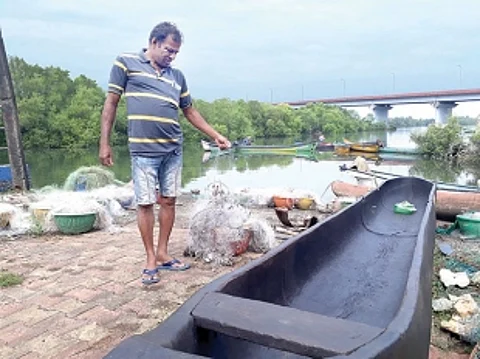

MARCOS GONSALVES
marcos@herald-goa.com
MARGAO: Over 4,500 traditional fishing families from Salcete and surrounding areas that claim to have been affected by the pollution in River Sal on account of waste disposal, oil discharge from the boats and other factors have raised apprehensions that the varieties of shellfish found in the river are on the brink of extinction.
Herald visit revealed that over 4,500 families from Velim to Betul have been badly affected as these traditional fishermen claimed to have suffered 75 per cent losses in shellfish catch, besides a variety of other fish as compared to earlier.
Several traditional fishermen fear the day is not far, when the mussels, oysters, and black water clams will disappear from River Sal within the next few years. Shellfish, especially clams, which need a clean and conducive environment for breeding, are affected due to the movement of fishing boats with high power engines in River Sal, besides oil discharge. The sensitive shellfish which has its own breeding dynamics has been badly affected due to the pollution in the River Sal recently.
The fishing community fears that the shellfish that is consumed may be poisonous.
Speaking to Herald Remedious Crasto, a traditional fisherman from Assolna said they fear catching oysters from the river due to pollution.
"We have noticed that oysters are absorbing the particles that are polluted due to the waste and oil discharged into the river. This can even lead to major health issues to the consumers", he feared.
Like several other traditional fishermen, Remedious has been into the traditional fishing activities since childhood and hence has vast knowledge of the activities related to fishing in River Sal.
"We have noticed a shortage of shellfish in the River Sal for the last few years, and the main reason is pollution. The main activity of the traditional fishermen from this belt was to catch oysters, clams and mussels, besides a variety of fish via various traditional fishing methods in the river", he explained.
Remedious said the fishing boats with high power engines, which are illegal, have destroyed the breeding of shellfish. However, the government has no control and checks on the boat owners using the illegal high power engines.
"We have even noticed huge vessels releasing oil into the river, besides there is no control on the release of sewage into the river. The movement of cruise boats in recent days has further destroyed the traditional fishing activities in the area", he claimed.
He said there was bumper catch in shellfish in the earlier days, when the River Sal was undisturbed.
He also accused the government and all the concerned departments of neglecting the issues pertaining to traditional fishermen who depend fully on River Sal.
Eighty-three-year-old traditional fisherman Agostinho Colaso claimed that they lost the rich treasure of shellfish catch due to River Sal pollution.
"The dreading of River Sal has further added to their problems. The discharge of oil into the river has become a routine activity which has affected the breading of shellfish,” he said.
Agostinho Furtado, president of Assolna-Velim-Betul-Chinchinim Traditional Fishermen Association said the pollution of River Sal has taken away the livelihood of the traditional fishermen living on the edges of the river.
"We have noticed the release of raw sewage into River Sal from the two sewage treatment plants set up at Navelim. Allowing the cruise boats has added to our woes. Hence, we demand that the government maintain a strict vigil on the illegal activities in River Sal", he demanded.
Seby D'Silva, another fisherman, said they noticed dead fish in the last few days due to massive pollution in the river.
He claimed that it can be due to the release of chemicals into the River Sal by unknown persons.
The traditional fishermen accused the concerned authorities of completely neglecting their issues, which have resulted in River Sal pollution, and they claimed that the same has ultimately affected their livelihood.